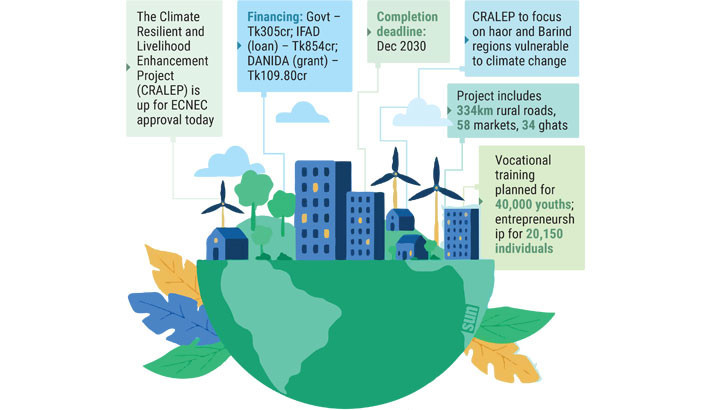
A Tk1,268.80-crore prject to build climate-resilient infrastructure and improve livelihoods in the country’s haor and drought-prone Barind regions is set to be tabled for approval at the Executive Committee of the National Economic Council (ECNEC) meeting today.
The proposed Climate Resilient and Livelihood Enhancement Project (CRALEP) – to be jointly financed by the Government of Bangladesh (GoB), the International Fund for Agricultural Development (IFAD), and the Danish International Development Agency (DANIDA) – aims to protect vulnerable communities from floods and droughts while creating sustainable economic opportunities.
The scheme will be implemented by the Local Government Engineering Department (LGED) under the Local Government Division, with work scheduled to run from January 2026 to December 2030.
The government will provide Tk305 crore of the funding, while Tk854 crore will come as IFAD loans and Tk109.80 crore as DANIDA grants.
“This initiative aims to protect communities from floods and droughts by building climate-resilient rural infrastructure, creating livelihood opportunities, and promoting sustainable income sources,” a senior Planning Commission official told the Daily Sun.
“Once implemented, it will significantly strengthen resilience, reduce poverty, and improve overall well-being in targeted regions,” the official added.
Under CRALEP, LGED will build 334 kilometres of rural roads – 141km in haor areas and 193km in Barind – develop or rehabilitate 58 rural markets, construct 34 ghats, and provide vocational training to 40,000 youths alongside entrepreneurship training to 20,150 individuals.
The project will also help 2,980 Local Community Society (LCS) members adopt sustainable livelihoods.
In 320 villages, access to basic facilities will be improved through the installation of 480 toilets, 720 tube wells, and 72 temporary grain storage and shelter killas.
To shield communities from natural hazards, low-cost, nature-based protection systems will be developed in 280 haor villages, complemented by improved internal walkways and sanitation facilities to boost mobility and hygiene.
A feasibility study by Consultants Group confirmed the project’s strong financial and economic viability. It reported a financial net present value (NPV) of Tk1,486.74 crore, an economic NPV of Tk2,219.50 crore, benefit-cost ratios (BCR) of 2.93 and 1.66, and internal rates of return (IRR) of 38.51% and 34%, indicating robust returns on investment. The Project Evaluation Committee (PEC) reviewed CRALEP on 24 April 2025 and recommended its approval after revising the Development Project Proposal (DPP).
It has since been included as a new, unapproved project in the Annual Development Programme (ADP) for the 2025-26 fiscal year.
According to the Planning Commission, CRALEP aligns with Bangladesh’s national development priorities and supports the Sustainable Development Goals (SDGs) – notably Goal 1 (No Poverty), Goal 9 (Industry, Innovation and Infrastructure), and Goal 13 (Climate Action).
“If implemented as planned, the project will strengthen resilience in flood- and drought-affected regions, enhance adaptive capacity, and contribute to long-term socio-economic stability,” said Dr Md Mustafizur Rahman, member (secretary) of the Agriculture, Water Resources, and Rural Institutions Division at the Planning Commission.
The commission has recommended that ECNEC give the green light to CRALEP, paving the way for a significant expansion of climate-smart rural infrastructure and livelihood support in some of the country’s most climate-vulnerable regions.


